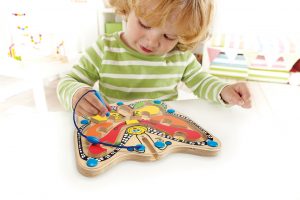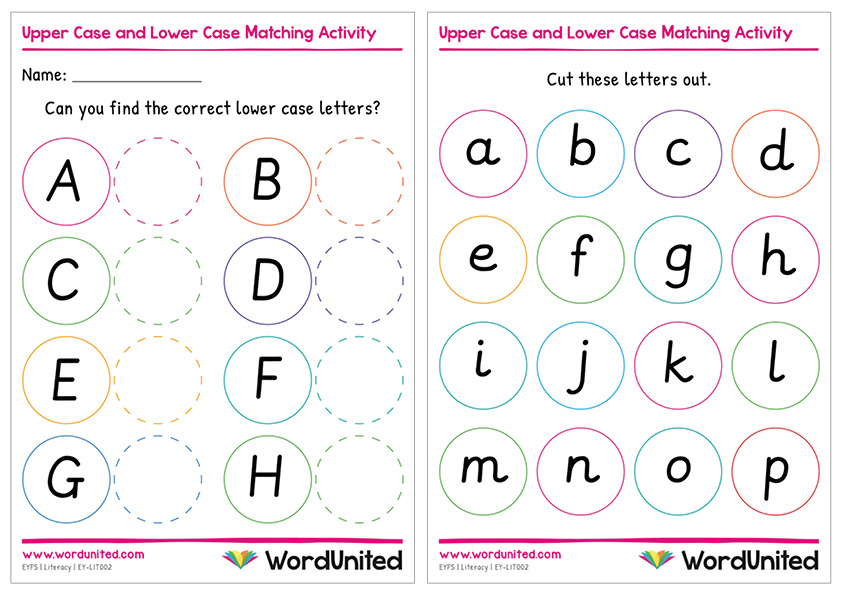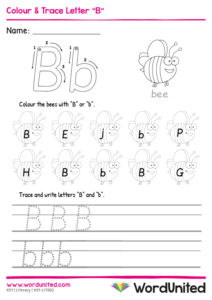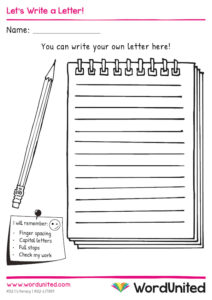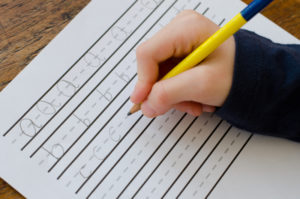No products in the cart.
How to Teach a Child to Write: 7 Fun and Easy Ways! [2023 updated]
August 17, 2019

How to Teach a Child to Write
Learning to write is an important and exciting part of childhood development that can later help to improve educational success. If you are wondering how to teach a child to write, check out our 7 fun and easy ways below where we tell you all about intriguing games, free handwriting sheets, the best apps and more.
1. Fine-Motor Skills Games
Handwriting is a skill that is weaved into many aspects of education. Yet, you can help your child develop relevant pre-writing skills before they even begin school. A great place to start is strengthening the hand muscles and improving fine-motor skills in early childhood. There are a variety of Fine Motor Skills Activities that your kids will enjoy. Threading toys and chunky wooden puzzles are a fun way to establish hand-eye coordination and fine-motor skills. Resources such as lacing butterflies, dragons and buttons can help children increase their recognition of colours whilst building stronger hand muscles. Jigsaw puzzles such as this fairtrade wooden dog promote dexterity as children grasp and manipulate the pieces to create the final product. Children can also practice moulding play dough into different shapes and stacking blocks. Soon, these skills will transfer to using handwriting tools like pens and pencils.
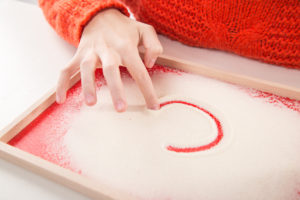
2. Mark Making Activities
As their hand muscles strengthen, children begin mark making. Start with hands-on approaches for a sensory experience by using fingers. Squirt shaving foam, poster paint or sand onto a plate for children to make patterns in – seeing how their finger actively draws lines and makes the foam, paint or sand move can help your child to establish an understanding of cause and effect through mark making. Not only this, but the freedom of using their hands in sensory play can stimulate your child’s imagination and creativity. If messy play is not an option, another activity idea is to roll out a large sheet of paper for children to draw or scribble on. You can encourage the use of tools such as oversized crayons so that children can work on their grip whilst mark making. Displaying any artwork children make in classrooms or around the house can improve confidence in their skills and boost interest in learning to write.
3. Alphabet Practice
Expanding knowledge of the alphabet can support your child’s learning of letters. Remembering the alphabet may require repetition; try creating songs and rhymes as an entertaining and memorable way to learn letters. For a quick alphabet activity, grab some magnetic letters and practice ordering them on the fridge or a whiteboard. One of the best ways to encourage letter learning is getting your child to practice spelling their name. If your child enjoys sensory play, tactile textured letters or cards enable kids to trace the letters with their fingers, which can help to establish the correct stroke when forming the letters. Alphabet puzzles like Dizzie the Dinosaur are a sweet way of incorporating learning letters and building dexterity simultaneously. We also have a range of free printables such as alphabet matching activities and colour by letter formation sheets over on our Free Resources Hub.
4. Letter Formation Worksheets (Free Printables)
Before starting letter formation sheets, it is extremely beneficial to teach your child how to correctly grip their pen or pencil with their finger and thumb. Some kids may find pencil grips to be a useful resource in the early stages of handwriting. You can create your own letter tracing worksheets by drawing your child’s name in dots for them to trace or download our free letter formation worksheets from our resource hub. For example, letter formation sheets such as alphabet tracing are a fabulous place to start. As an alternative to letter formation worksheets, why not take a look at WordUnited’s alphabet flashcard kit. Bursting with vibrant real-life images and traceable letters, the flashcards are write and wipe, meaning your child can practice their letters again and again.
5. Writing Letters and Stories (Free Printables)
Changing the narrative and creating engaging activities such as writing stories and letters can help to motivate your child to pick up their pen. Not only this, but these activities allow your child’s voice and inner thoughts to be heard, increasing their self-esteem and creativity. Kids can write letters to a penpal, such as a friend or family member, or create their own stories. Writing about their life is a charming way for children to practice handwriting without realising. Plus, the idea that someone may like to read what they have written can inspire a focus on neat presentation. You can download a letter template for free.
6. Apps for Handwriting
In a world that is continually evolving, technology is playing an increasingly significant role in education. Not surprisingly, there are a variety of apps that can provide handwriting practice for kids; theschoolrun.com suggests iTrace for complete beginners & Cursive Writing Wizard for cursive handwriting. Though apps are a fantastic addition for children learning to write, it is vital that traditional pen and paper are also utilised to support the development of fine-motor skills and muscle strength necessary for gripping and controlling pencils when writing. Therefore, it is useful to pair learning through apps with handwriting practice sheets. To read more about this topic, click here.
7. Handwriting Practice Sheets
Handwriting worksheets are a brilliant way for children to reinforce key rules and skills regarding writing and complement handwriting resources. Kids can learn about movement pathways with sing-along books that use funny characters and songs to make handwriting memorable or practice entry and exit strokes with beginner’s books filled with handwriting worksheets. Similarly, use our free Letter Formation Sheets to improve letter formation, as kids trace the letters to improve their handwriting. Our Handwriting Practice Sheets free printable contains all 26 lowercase letters – one page for each letter, which will allow for plenty of handwriting practice. Don’t forget to try out Scholastic English skills books for KS1 and KS2. With back-to-back handwriting sheets for kids aged 4-9, children can follow the tips and tricks to reinforce good writing practice.



 01782 698558
01782 698558


